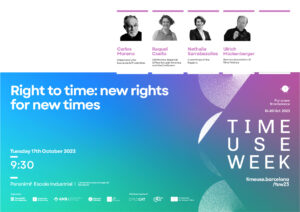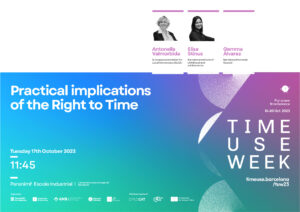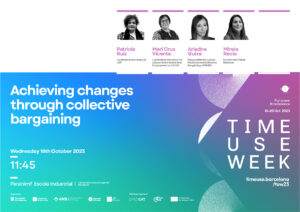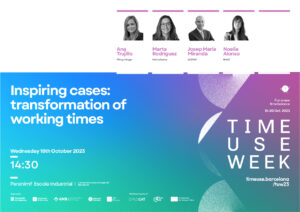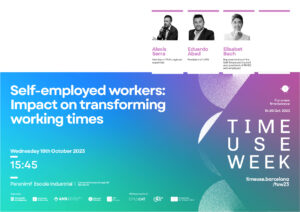Time Use Week 2023
For a new time balance
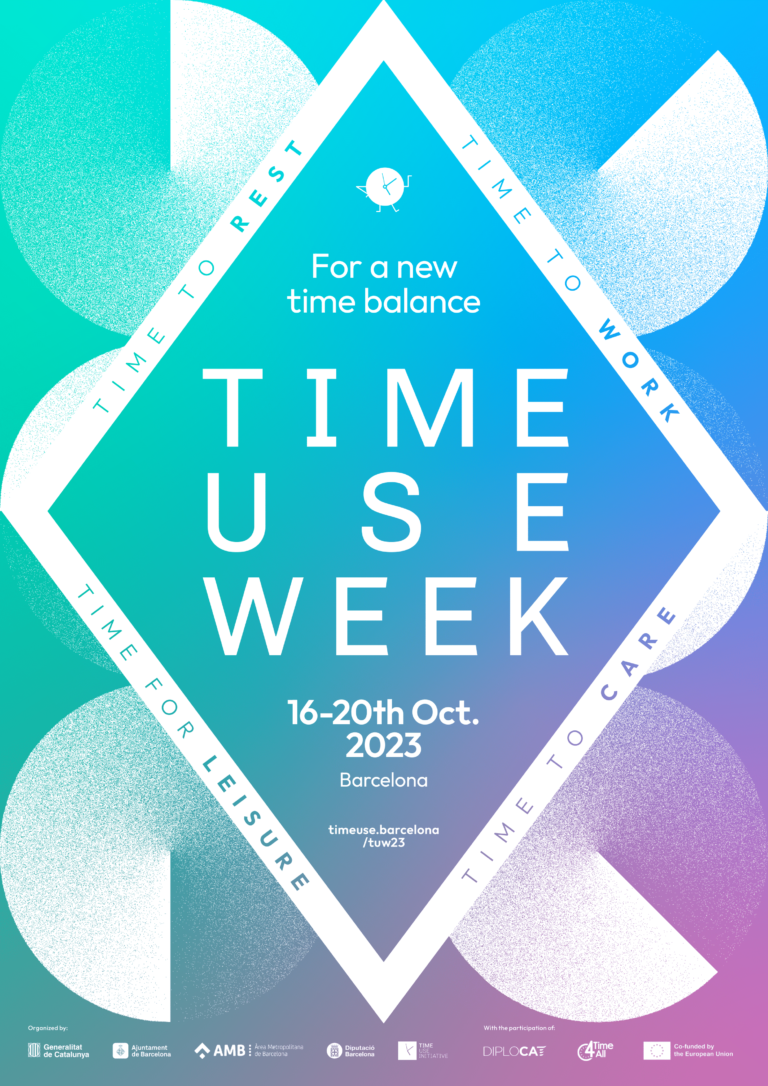
Towards a new time balance
The Time Use Week is the international event for promoting knowledge and inspiration cases on time policies. Researchers, political institutions, social organisations, and citizens from all over the world participate and push the debate, advocating from their different fields of expertise, towards a better social time organisation. The upcoming tenth edition will take place between October 16th and 20th in Barcelona, under the motto “Towards a new time balance”.
Time policies are measures that modify or nudge established social time structures that combat time poverty while facilitating or enabling the right to time. The right to time suggests a different way of thinking about the world and how we organise our societies. It pursues a four-part goal: to improve health by aligning our social time structures with our biological clocks; to reduce inequalities by finding realistic solutions to time poverty; to improve sustainability by fostering habits change and rethinking the relationship between space and time in a way that is respectful of the environment and which builds more sustainable communities, and to improve productivity by implementing innovative work schedules and arrangements.
During the Time Use Week 2023, conceptual discussions and practical workshops will be held on the issue of the right to time and its impacts on different public policy fields. The discussion on the right to time will be opened to all participants, especially to international organisations and representatives from local and regional governments. The Local and Regional Governments Time Network‘s General Assembly will take place within the week and framed on the right to time debate.
The future of working time will also be discussed, asking especially how public policies and private initiatives are tackling it. A conceptual framework of working times will be presented, and the debate will be opened to relevant stakeholders.
During the Week, on-site participates will be able to participate in participatory activities (such as workshops or other events). They will also have the opportunity to enjoy of a participatory exhibition by the Suspended Time Institute.
Practicalities
Working languages of all international events will be English, Spanish, and Catalan. All international events will have simultaneous interpretation.
The Time Use Week 2023 will be hosted in a hybrid format in order to be accessible for everyone, everywhere, at their time of convenience. However, there will be specific events, such as workshops or networking opportunities, that will take place only in person at the venue. Registration is needed for both options.
Venue: Paranimf de l’Escola Industrial (access by carrer Urgell, 187), Barcelona.
Registration and accommodation at the Venue (carrer Urgell, 187, Barcelona).
On-site event. Language: Catalan.
On-site event. Language: Catalan.
Institutional opening of the Time Use Week 2023, with the participation of all elective representatives from the four promoter institutions (Catalan Government, Barcelona City Council, Barcelona Metropolitan Area, Barcelona Provincial Council) and the TUI.
On-site event by invitation only. Language: Catalan.
On-site event. Language: Catalan.
The aim of the session is to generate an exchange space that allows progress towards an improvement in collaboration between research spaces and the public sector in Catalonia, fostering the collaboration with the Catalan Network for the Right to Time.
On-site event by invitation only. Language: English.
Meeting of the Local and Regional Governments Time Network’s Executive Board in order to discuss the Network’s governance and activities. This meeting is for the Executive Board members only.
Registration and accommodation at the Venue (carrer Urgell, 187, Barcelona).
Hybrid event. Languages: English, Spanish, Catalan.
This session will open the day by presenting a position paper conceptualising the right to time. After the presentation of the paper, we will open the space for reaction with different experts from different fields concerning the topic. Finally, the session will open a dialogue with the audience, inquiring about their main concerns over the right to time.
- Carlos Moreno, Global Observatory for Sustainable Proximities.
- Raquel Coello, Regional Specialist for Economic Empowerment Policies of UN Women’s Office for the Americas and the Caribbean.
- Nathalie Sarrabezolles, Rapporteur of a EU Committee of the Regions opinion on “Work-life balance for parents and carers”.
- Ulrich Mückenberger, German Association of Time Policies.
On-site event. Language: English.
Parallel work sessions around key topics related to the right to time. Each session will count on a keynote speaker and good practices from cities setting the framework. Following, there will be an interactive dynamic where we will pose challenges to be solved by the participants from their cities’ perspectives.
Workshop 1 — Time for Democracy, by Antonella Valmorbida, Secretary General of the European Association for Local Democracy (ALDA).
This workshop will explore the connection between time and democratic participation and will be structured in 3 parts. First, we will open with a keynote speech by ALDA, reflecting on the importance of time for democracy. Afterwards, we will have the intervention of two cities to share their experiences in implementing actions to promote time for democracy. Afterwards, the audience will split into groups to think of concrete actions to promote time policies to foster people’s civic participation, especially for those more vulnerable groups.
Workshop 2 — Our children’s time, by Elisa Stinus, Research of the Institute for Chilhood and Adolescence of Barcelona.
This workshop will share the results of a survey made to children about their time concerns, and it will use their inputs to think about what kind of policies we can apply in our cities to answer their needs. It will be structured in 3 parts. First, we will open with a keynote speech reflecting on the concerns of children over time. Afterwards, we will have the intervention of two cities to share their experiences in implementing actions to address these concerns. Afterwards, the audience will split into groups to think of concrete actions to promote time policies to give possible solutions to children’s unease understanding of time use.
Workshop 3 — Caring cities: let’s discuss care and time, by Gemma Álvarez, Barcelona Provincial Council.
This workshop will explore how time can be integrated transversally into care policies within the “Caring Cities” frame. It will be structured in 3 parts: first, we will open with a keynote speech reflecting on the different axes in which time and care connect. Afterwards, we will have the intervention of two cities to share their experiences in implementing actions to address care policies, taking time as a central factor. Afterwards, the audience will split into groups to think of concrete actions to promote time into care policies.
Hybrid event. Languages: English, Spanish, Catalan.
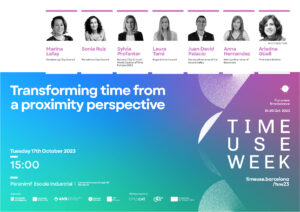
Celebration of the General Assembly of the Local and Regional Time Network, with the presentation of the World Capital of Time Policies for 2024. The session will present the Ibero-American perspective on the right to time, and it will also touch upon time policies applied at the metropolitan level and plan the network strategy for 2024-2026.
- Julien Defer, Office collaborator of the Mayor and President of the Municipality and Eurometropolis of Strasbourg.
- Sonia Ruiz, Director of the Gender and Time Policies Service of the Barcelona City Council.
- Sylvia Profanter, Bolzano City Council, World Capital of Time Policies 2023.
- Laura Tami, Undersecretary of the Women’s Secretary of the Bogotá City Council.
- Anna Hernández, Director of the Economic Development Agency of Barcelona Metropolitan Area.
- Carmine Pacente, Head of European Politics and Funds of the Milan Metropolitan Area.
- Juan David Palacio Cardona, Director of the Aburrá Valley Metropolitan Area.
Event by invitation only. Language: English.
Annual assembly of the Local and Regional Time Network. The session will review the cities awarded the World Time Capital title and present the Ibero-American perspective on the right to time. It will also touch upon time policies applied at the metropolitan level and plan the network strategy for 2024-2026. With the participation of:
- Sylvia Profanter, Bolzano City Council, World Capital of Time Policies 2023.
- Laura Tami, Bogotá City Council.
- Juan David Palacio Cardona, Metropolitan Area of the Aburrá Valley.
- Representative from the Barcelona Metropolitan Area.
Registration and accommodation at the Venue (carrer Urgell, 187, Barcelona).
Hybrid event. Languages: English, Spanish, Catalan.
The session will present a position paper that aims at setting a new framework for the future of working times. After the presentation of the paper, we will open the discussion for international and local experts to comment on the document. At the end of the interventions, there will be a space for the questions of the public. With the participation of:
- Martine Humblet, International Labour Organisation.
- Jorge Cabrita, Eurofound.
- Lucía Scuro, Economic Commission for Latin America and the Carribean (CEPAL).
- Jon Bernat, University of the Basque Country.
- Carmen Castro, University of Valencia.
- Eva Rimbau, Open University of Catalonia.
- María Luz Vega, Complutense University of Madrid.
Hybrid event. Languages: English, Spanish, Catalan.
This session will discuss the experiences and the role of unions in the new working times organisations. The focus will be on the Spanish case from the point of view of social agents, by reflecting on the main challenges first and giving concrete examples later. With the participation of:
Cristina Torre López, Secretary for Labour Union Action and Just Transitions of CCOO Catalonia.
- Patricia Ruíz, Confederal Secretary of UGT.
- Ariadna Guixé, Labour Relations and Collective Bargain Responsible from PIMEC.
- Mireia Recio, Department of Labor Relations and Social Affairs from Foment del Treball.
Hybrid event. Languages: English, Spanish, Catalan.
This session will present concrete experiences from companies already changing the conception of working times. It will count with international and local organisations of different sizes and industries. With the participation of:
- Sonia Ruiz, Director of the Gender and Time Policies Service of the Barcelona City Council.
- Josep Maria Miranda Garuz, Managing director of ACEFAT.
- Noelia Alonso, Head of People at BMAT.
- Gonçal Calvo, Head of Innovation at BMAT.
- Ana Trujillo, Senior Recruitment & Employee Relation Specialist at Elring Klinger.
- Marta Rodríguez Martín, Director of Organization, People and Culture at Mercabarna.
Hybrid event. Languages: English, Spanish, Catalan.
- Mònica de Castro, Musicotherapist, founder of SINGULAR Música & Alzheimer.
- Alexis Serra, member of the Regional Expert Lab of the Time Use Initiative.
- Eduardo Abad, President of the Spanish Professionals and Self-Employed Workers (UPTA).
- Elisabet Bach, representantive from the Catalan Council of Self-Employed Work and President from Pimec Self-Employed.
On-site event only by invitation. Language: Catalan.
First meeting of GENERA project’s Advisory Council, led by the Centre d’Estudis de la Vida Quotidiana i el Treball (QUIT), and with the participation of different institutions. This meeting is private and only for invited institutions.
All Time Use Week’s media resources can be found here.
Institutional partners
The Time Use Week 2023 is co-organised by the Catalan Government, the Barcelona City Council, the Metropolitan Area of Barcelona, the Barcelona Provincial Council, and the Time Use Initiative.
It counts with the collaboration of DIPLOCAT and Time4All (project co-funded by the European Union).




